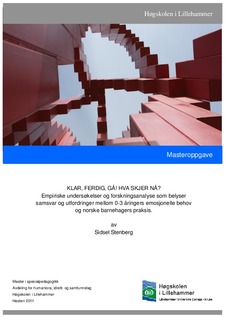| dc.description.abstract | Norway is one of several western countries where most children spend long days in non-parent care. The number of children aged 0-3 has grown quickly and in 2008 near 80 % of the nation‟s one year olds attended kindergartens. Building enough kindergartens has been a priority for the Norwegian government since mid 1990s. Now, the focus has shifted towards quality of care. Studies show that high-quality child care supports the positive social, emotional, and cognitive development of young children. Some of the experts in children‟s welfare and development are concerned about the effects of center-based care in early years, especially if the quality is poor.
The aim of this thesis is to outline the emotional needs for children aged 0-3, and how kindergartens may provide a high-quality psychosocial environment for this age-group. To answer this, the following research questions were operationalized;
1. How does research describe emotional development and needs of children age 0-3?
2. How do Norwegian kindergartens meet these requirements?
a. What conditions exist which influence processes and interactions?
b. What are the viewpoints of pedagogical staff regarding structural terms and practice relative to providing high quality care?
The thesis has a hermeneutic approach, starting with a systematic literature review followed by empirical investigations; a survey and interviews. The systematic review focuses on empirical findings and theories concerning day-care quality and emotional needs. The survey measures indicators of structural quality and targets all public kindergartens in a municipality, whilst the interviews investigate the reflections pedagogical staff holds concerning the care they provide.
The review identified ten main needs; adequately trained personnel, parent/staff co-operation, inter-staff co-operation, low turnover, predictable routines, sense of belonging, staff-child bonding, interactions, a positive physical environment and facilitation of personal and cultural development. Structural quality measurements of care in the survey selection are within Norwegian laws and regulations. Despite this, interview findings reveal that pedagogical staff experiences a strenuous pressure to perform. They feel an inability to provide adequate interaction with each child, attention to group dynamics and supervision of junior staff.
Norwegian regulations on group sizes, staff-to-child ratios and caregiver qualifications seem not to ensure a high quality psycho-social environment as defined by the review, and meeting only minimum requirements. This may negatively influence processes and interactions as communicated through the interviews. | no_NO |
